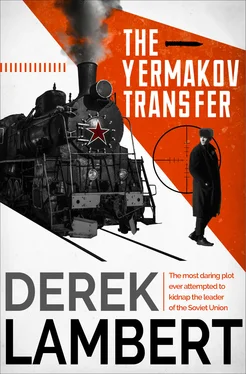Here Pavlov’s soul-searching got waylaid. His great grandfather lived in a palace, brawling, whoring and gambling and using gold nuggets for ashtrays. He was a millionaire, a capitalist, and thus an enemy of the revolutionaries – a White Russian. Most of the Jews were Reds.
Pavlov allowed his great grandfather to retreat from his deliberations; across Eastern Siberia during the Civil War where he was finally shot by the American interventionists who were not always sure which Russians they were supporting – Reds or Whites.
Pavlov concentrated on World War I. Scapegoats again. The Tsarist government, trying to explain its shattering defeats by the Germans, blamed traitors in their midst. Jews, naturally.
Then, after the Revolution, the Jews came into their own. The Star of David in ascendancy; but too brilliantly, too hopefully, a shooting star doomed to expire. The Jews were among the leaders of the October Revolution and, with an optimism which had no historical foundation – bolstered by the Balfour Declaration in November, 1917 – they anticipated the end of persecution. They were Russians, they were Bolsheviks, they were Jews.
Even V. I. Lenin lent his support in a speech in March, 1919:
“Shame on accursed Tsarism which tortured and persecuted the Jews. Shame on those who foment hatred towards the Jews, who foment hatred towards other nations.
“Long live the fraternal trust and fighting alliance of the workers of all nations in the struggle to overthrow capital.”
Today, Viktor Pavlov thought, it was Leninism that he was fighting.
During the Civil War his grandfather, half-Jewish, a rabid Bolshevik, fell in love with a wild Jewish Muscovite who wore a red scarf and gold earrings. Illegitimately, they sired Pavlov’s father.
According to Pavlov’s father, Leonid, they had always intended to marry. But when the shooting star faded and Stalin, frightened of the Jewish power around him, began to turn on the Jews again with a ferocity unequalled by his aristocratic enemies, there came the 1 a.m. knock on the door. Pavlov’s grandfather, who looked a little like Trotsky, was away addressing a meeting of railway workers; but his wife was at home and they took her away to one of the camps which history has always provided for Jews and she died giving birth to Leonid Pavlov.
There is my motive, Viktor Pavlov thought. The origins of my hatred. More often than not, he believed it.
* * *
He was born in violence during the siege of Leningrad in World War II, the son of a teenager, Leonid Pavlov, and a peasant woman, possibly wholly Jewish, possibly not, who had found time in between dodging shells and eating stews made of potato peelings and dog meat, to make love and get married. She was killed by a German shell shortly after giving birth to Viktor.
So many records were destroyed during the siege that it was easy to register Viktor as a Russian. This grovelling hypocrisy angered him in his teens, but later it was to become his strength.
When he was ten Viktor Pavlov stopped some bullies beating up a small boy with springy black hair, rimless glasses and a dark complexion, in the school playground in Moscow.
“Why,” he demanded, grabbing the arm of the biggest bully, “are you picking on him?”
The bully, whose name was Ivanov, was astonished. “Why? Because he’s a Yid, of course.”
“So what?” Pavlov was an athletic boy with flints in his fists which commanded respect.
“So what? Where have you been? Everyone knows about the Jews – it’s in the papers. They’ve just closed the synagogue down the road. It was the centre of the black market in gold roubles and Israeli spies.”
“I didn’t know you read the papers,” Pavlov remarked. “I didn’t know you could read.”
A crowd had gathered round the two protagonists on the sunlit, asphalt playground. The original victim had vanished.
Ivanov, who had a pudding face and pale hair cut in a fringe, ignored the question. “My father’s told me about the Yids. He was in the war.…”
“So was mine.”
“He said the Jews wouldn’t fight. He says we should finish off the job Hitler started.”
“Then your father’s an idiot. I was born in Leningrad. The Jews fought well. And what about the Jewish generals?”
Dodging logic, Ivanov searched for a diversion. He stared closely at Pavlov’s intense dark features, his cap of black hair, his hawkish nose; he saw intelligence and good looks and it made him mad. “Are you a Yid?” he asked. “Are you Abrashka?”
The crowd of boys was silent. The question was a provocation, an insult; although they weren’t sure why. Why was an evrei , so different from a Kazakh, a Kirghiz, a Uzbek?
Ivanov grinned. “Prove it.”
A cold, dark anger froze inside Pavlov, like no anger he had experienced before. He wanted to batter Ivanov into insensibility; to kill him. “I’ll prove it” – he put up his fists – “with these.”
Ivanov was still trying to grin. “That’s not proof.”
“What proof do you want?”
“Show us your cock.”
Recently, there had been a scandal in the suburb about Levin the circumciser. He had performed the small operation on the penis of a baby and then gone to Leningrad for a couple of days. But there had been sepsis, so the baby’s parents took the baby to a clinic where a Jewish doctor dressed the cut and told the parents they needn’t worry. But a porter reported the case to the police.
Three weeks later, after intensive interrogation, Levin made a public address renouncing his profession. It was, he announced in a beaten voice, a barbaric ritual. He appealed to Jews all over the Soviet Union to abandon it.
Pavlov advanced on Ivanov. Ivanov backed away appealing to the others: “I bet he’s been cut.” A few sniggered, the rest remained silent because there was ugliness here they couldn’t comprehend.
Pavlov hit him first with his left, then with his right, dislodging a tooth. Ivanov fought back strongly but he couldn’t match the inexorable determination of his opponent, his controlled ferocity. He got home blows in the face and stomach but they had no visible effect on Pavlov who kept coming at him. Pavlov bloodied Ivanov’s nose, closed one eye, buckled him with a punch in the solar plexus. Ivanov went down and stayed down whimpering.
Pavlov stood over him. “So you want to see my cock? Then you shall see it and lie there while I piss all over you.”
Pavlov unbuttoned his fly and took out his penis, foreskin intact. But he was saved from degrading himself by the appearance of a teacher. He buttoned himself up, standing defiantly beside his fallen opponent.
They were both punished for fighting but no reference was made to the reason for the fight. The teacher seemed to understand Ivanov’s attitude; likewise he understood Pavlov’s reaction to the suggestion that he might be a Jew.
This was Pavlov’s private shame: that he had taken the suggestion as an insult. He resolved to find out more about his mongrel heritage and asked his father: “Am I a Russian or a Jew?”
They were sitting in the small wooden house in the eastern suburbs of Moscow drinking borsch soup, mauve and curdled with dollops of cream, and black bread, which Viktor rolled into pellets. His father, although still a young man, was almost a recluse, hiding his Jewishness, earning a meagre living doing odd jobs and keeping his nose clean. Although in his death throes, Stalin was still on the ram-page.
His father stopped drinking his soup. “Why do you ask?”
Viktor told him what had happened in the playground.
His father looked worried. “Why fight about a thing like that?”
“I don’t know. Why should I be so angry because he suggested I was a Jew?”
Читать дальше












